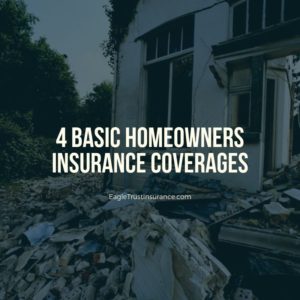 Homeowners insurance provides 4 critical types of coverage. It’s helpful to understand what these are, in case you need to file a claim. Most people are surprised to learn that homeowners policies cover more than your actual home. Here’s a closer look at what homeowners insurance covers.
Homeowners insurance provides 4 critical types of coverage. It’s helpful to understand what these are, in case you need to file a claim. Most people are surprised to learn that homeowners policies cover more than your actual home. Here’s a closer look at what homeowners insurance covers.
1 – Building
The building itself is the first type of coverage, and probably the most important. It includes the primary structure (the house) plus garages, sheds, fencing, retaining walls, and other structural elements on your property. It protects them from damage caused by fire, theft, vandalism, snow, lightening, explosions, and the like. What most standard policies do not cover is damage caused by flooding and earthquake, although you can purchase protection for those separately.
2 – Contents
Your personal belongings (i.e. furniture, electronics, clothing, jewelry) are also covered under your homeowners insurance policy. However, the total value is limited. It’s typically calculated as a percentage of your home’s value. You can, and in many cases should, purchase additional personal property protection, especially if you own high priced items such as antiques or collectibles. Contact your insurance agent for more information and to obtain a quote on additional coverage.
3 – Liability
Liability covers medical and legal expenses related to someone being injured by you or a member of your immediate family. This applies to injuries inside of your home or elsewhere. Here are some common examples:
- Slips and Falls
- Dog Bites
- Food Poisoning
- Injuries from Outdoor Activities
As with the other types of coverage, there is a limit. Additionally, most policies exclude intentional acts (i.e. your son or daughter intentionally punching someone).
4 – Temporary Living Expenses
In cases where major damage occurs to your home, you may need to move out for a period of time while your home is being repaired. Most homeowners insurance policies cover the cost of temporary housing and the storage of your belongings. Review your policy for details on the length of time and/or maximum dollar amount for temporary living expenses.
More on What Homeowners Insurance Covers
Now that you have a better sense of what homeowners insurance covers, you can be better protected. Purchase additional coverage for items not typically included, such as flood damage or expensive belongings. Contact your insurance company for incidents that are covered, such as liability-related injuries. However, do remember that a deductible applies and other factors should be considered when deciding whether to file a claim. If you face a unique circumstance and are unsure, contact your insurance agent to discuss your options.

 5 Safety Tips for Driving at Night
5 Safety Tips for Driving at Night

